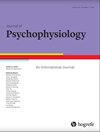Auditory Sensory Gating and the Big Five Personality Factors
IF 0.9
4区 心理学
Q4 NEUROSCIENCES
引用次数: 8
Abstract
Abstract. Sensory gating allows an individual to filter out irrelevant sensory information from the environment, potentially freeing attentional resources for more complex tasks. Some work has demonstrated a relationship between auditory sensory gating and cognitive skills such as executive function, although the functional significance is not well understood. The relationship between sensory gating and personality dimensions has not been adequately explored. Participants completed a paired-tone sensory gating event-related potential (ERP) paradigm and the Big Five Inventory to assess personality characteristics. Participants with more robust P50 sensory gating reported a significantly greater degree of conscientiousness; conscientiousness (but not the other Big Five factors) predicted sensory gating ability. Longer ERP latencies were associated with participants being more conscientious (P50 component), more agreeable, and less neurotic (N100 component). A better understanding of the behavioral correlates of sensory gating will help elucidate the functional consequences of reduced sensory gating both in typical adults and clinical groups.听觉感官门控与五大人格因素
摘要感觉门控允许个体从环境中过滤掉不相关的感觉信息,潜在地释放注意力资源,用于更复杂的任务。一些工作已经证明了听觉感觉门控和认知技能(如执行功能)之间的关系,尽管其功能意义尚未得到很好的理解。感觉门控与人格维度之间的关系尚未得到充分的探讨。被试完成了双色调感觉门控事件相关电位(ERP)范式和大五量表来评估人格特征。P50感觉门控更强的参与者报告了更大程度的责任心;责任心(但不是其他五大因素)预测了感觉门控能力。较长的ERP潜伏期与参与者更认真(P50分量)、更随和、更少神经质(N100分量)相关。更好地理解感觉门控的行为相关性将有助于阐明在典型成人和临床群体中减少感觉门控的功能后果。
本文章由计算机程序翻译,如有差异,请以英文原文为准。
求助全文
约1分钟内获得全文
求助全文
来源期刊

Journal of Psychophysiology
医学-神经科学
CiteScore
2.60
自引率
7.70%
发文量
25
审稿时长
>12 weeks
期刊介绍:
The Journal of Psychophysiology is an international periodical that presents original research in all fields employing psychophysiological measures on human subjects. Contributions are published from psychology, physiology, clinical psychology, psychiatry, neurosciences, and pharmacology. Communications on new psychophysiological methods are presented as well. Space is also allocated for letters to the editor and book reviews. Occasional special issues are devoted to important current issues in psychophysiology.
 求助内容:
求助内容: 应助结果提醒方式:
应助结果提醒方式:


